The Collected Works of Jeremy Bentham
Since 1968, thirty-six volumes of the new and authoritative critical edition of The Collected Works of Jeremy Bentham have been published, from an anticipated total of more than eighty volumes.
The current General Editor of The Collected Works of Jeremy Bentham is Professor Philip Schofield. The edition's previous General Editors were J.H. Burns (1961–79), J.R. Dinwiddy (1978–83), Frederick Rosen (1983–95), and Frederick Rosen and Philip Schofield (1995–2003).
Short summaries of each volume published thus far may be found below, including the details of their editorship and links to each work on Oxford University Press Academic, UCL Press, and Oxford Scholarly Editions Online (institutional subscription required). WorldCat may also be used to find Collected Works volumes in libraries and at research institutions near you.
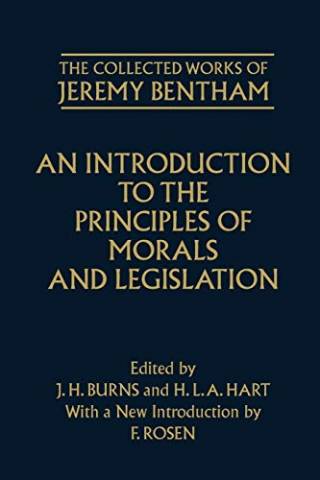 An Introduction to the Principles of Morals and Legislation (1970, republished with a new introduction 1996).
An Introduction to the Principles of Morals and Legislation (1970, republished with a new introduction 1996).

An Introduction to the Principles of Morals and Legislation, Jeremy Bentham's best-known work, is a classic text in modern philosophy and jurisprudence. First published in 1789, it contains the important statement of the foundations of utilitarian philosophy and a pioneering study of crime and punishment, both of which remain at the heart of contemporary debates in moral and political philosophy, economics, and legal theory.
Edited by J.H. Burns & H.L.A. Hart. Featuring an introduction by F. Rosen and an interpretive essay by H.L.A. Hart.
—Oxford University Press Academic.
—Oxford Scholarly Editions Online.
—First edition, 1789 (Google Books).
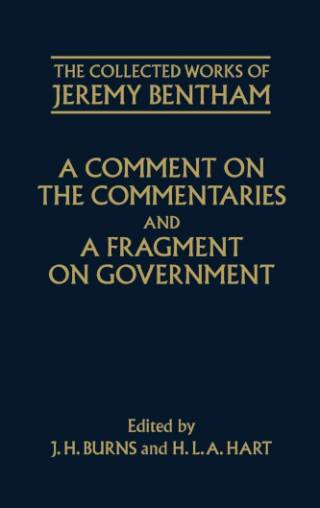 A Comment on the Commentaries and A Fragment on Government (1977, reissued 2008).
A Comment on the Commentaries and A Fragment on Government (1977, reissued 2008).

Edited by J.H. Burns and H.L.A. Hart.
A Fragment on Government, first published anonymously in 1776, was Bentham's first major publication. Concentrating on a passage of five or six pages in which Blackstone discusses the origin of society and government, Bentham offers three main criticisms. First, he criticizes Blackstone's methodology for failing to distinguish between the role of the expositor and the role of the censor, and thereby confusing the question of what the law is with the question of what the law ought to be. Second, he criticizes Blackstone's assumption that the theory of the social contract represents an adequate justification of the obligation to obey government. Third, he criticizes Blackstone's theory of sovereignty, which claims that in every state there must exist some absolute, undivided power, whose commands are law.
In 'A Comment on the Commentaries', on which Bentham began work in 1774 but never published during his lifetime, he exposes the fallacies which he claims to have detected in Blackstone's Commentaries, and criticises Blackstone's interpretation of the Common Law. Here Bentham provides important reflections on the nature of law, particularly on the nature of customary and of statute law, and on judicial interpretation in general.
—Oxford University Press Academic.
—Oxford Scholarly Editions Online.
—First edition of A Fragment on Government, 1776 (Google Books).
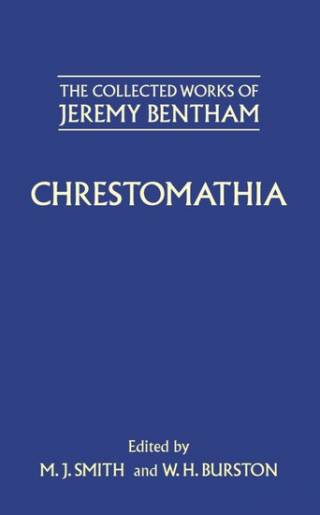 Chrestomathia (1983).
Chrestomathia (1983).

Edited by M.J. Smith and W.H. Burston.
Chrestomathia, part of which was first printed and privately circulated in 1815, with published versions of Part I and Part II of the text being published in 1816–17, is Bentham's major work on education. It contains Bentham's plans for a 'Chrestomathic' day school for children of the 'middling and higher ranks in life', which at one time he had planned to have erected in his garden at Queen's Square Place, Westminster, and nine lengthy appendices which are of fundamental importance to Bentham's thought, most notably on 'Nomenclature and Classification' and 'Universal Grammar'.
—Oxford University Press Academic.
—Oxford Scholarly Editions Online.
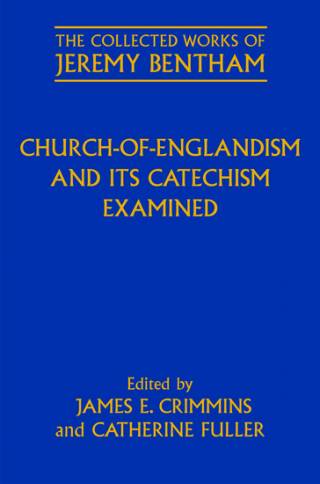 Church-of-Englandism and its Catechism Examined (2011).
Church-of-Englandism and its Catechism Examined (2011).

Edited by James E. Crimmins and Catherine Fuller.
Church-of-Englandism and its Catechism Examined, first printed in 1817 and first published in 1818, was part of Bentham's sustained attack on the English ecclesiastical establishment. Bentham argues that the purpose of the Church's system of education, in particular the schools sponsored by the Church-dominated National Society for the Education of the Poor, was to instil habits of insincerity into the population at large, and thereby protect the abuses which were profitable both to the clergy and the ruling classes in general. Bentham recommends the 'euthanasia' of the Church, and argues that government sponsored proposals were in fact intended to propagate the system of abuse rather than reform it.
—Oxford University Press Academic.
—Oxford Scholarly Editions Online.
—First edition, 1818 (Google Books).
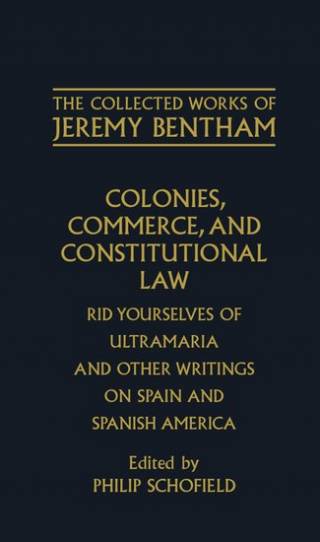 Colonies, Commerce and Constitutional Law (1995).
Colonies, Commerce and Constitutional Law (1995).

Edited by Philip Schofield.
Colonies, Commerce, and Constitutional Law is a major theoretical analysis of the harmful effects of colonies on commerce and constitiutional democracy, and is one of the most important studies of colonialism written in the nineteenth century. It contains Bentham's essays entitled 'Emancipation Spanish', 'Rid Yourselves of Ultramaria', 'Summary of a Work Intitled Emancipate Your Colonies', and 'Observations on the Restrictive and Prohibitory Commercial System'.
—Oxford University Press Academic.
—Oxford Scholarly Editions Online.
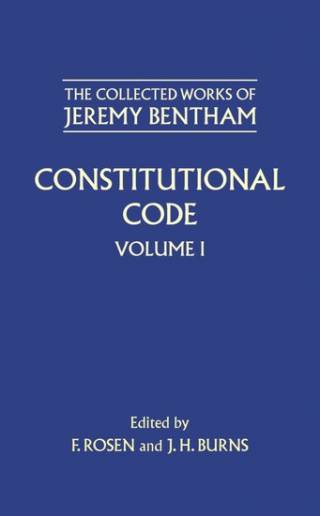 Constitutional Code, Volume I (1983).
Constitutional Code, Volume I (1983).

Edited by Frederick Rosen.
Bentham's massive, unfinished Code (1822–32) is the major work of his last years and contains the most important statement of the theory of constitutional democracy which emerges after his well-known 'conversion' to political radicalism in 1809–10. He develops here in a final form the theory and institutions of an ideal representative democracy addressed to 'all nations and all governments professing liberal opinions'. This first volume, based on the only volume Bentham himself published, covers chapters I–IX on the electorate, legislature, prime minister, and administration. The fully annotated text clarifies and develops historical allusions, and is provided with an especially detailed subject index.
—Oxford University Press Academic.
—Oxford Scholarly Editions Online.
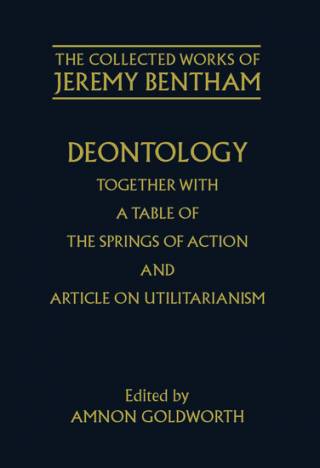 Deontology, together with A Table of the Springs of Action and Article on Utilitarianism (1983).
Deontology, together with A Table of the Springs of Action and Article on Utilitarianism (1983).

Edited by Amnon Goldworth.
A critical edition of three of Bentham's works, Deontology and The Article on Utilitarianism previously unpublished. Together with his An Introduction to the Principles of Morals and Legislation, they provide a comprehensive picture of Bentham's psychological and ethical views. This edition, based entirely on manuscripts written by Bentham of by his amanuenses, is equipped with a full introduction linking the three works. Each work is accompanied by detailed critical and explanatory notes.
—Oxford University Press Academic.
—Oxford Scholarly Editions Online.
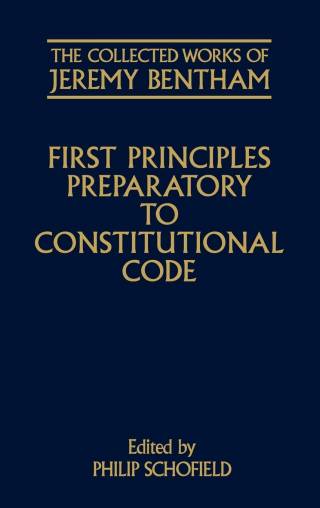 First Principles Preparatory to Constitutional Code (1989).
First Principles Preparatory to Constitutional Code (1989).

Edited by Philip Schofield.
The four essays by Jeremy Bentham assembled in this volume date from the spring and summer of 1822 and are based exclusively on manuscripts, many of which have never before been published. In the essays 'Economy as Applied to Office', 'Identification of Interests', 'Supreme Operative', and 'Constitutional Code Rationale', Bentham develops the general principles of constitutional law and government which underpin the detailed administrative provisions set out in Constitutional Code. In addition, original and penetrating discussions of such topics as sovereignty, constitutional rule, democratic and monarchical government, public finance, the aptitude and powers of officials, corruption, the influence of public opinion, and the delusive effect of religion and titles of honour, affirm Bentham's status as a political theorist of the first rank.
—Oxford University Press Academic.
—Oxford Scholarly Editions Online.
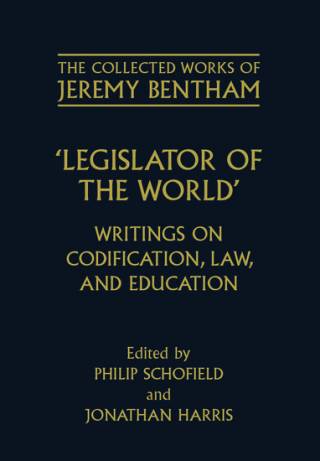 'Legislator of the World': Writings on Codification, Law, and Education (1998).
'Legislator of the World': Writings on Codification, Law, and Education (1998).

Edited by Philip Schofield and Jonathan Harris.
Bentham's central concern during the 1810s and 1820s was with the codification of the law. Rejecting both the common law and the historical approach to codification, he argued that a code of law should be based on a rigorous logical analysis of the categories of human action, and that each enactment should be followed by the reasons which justified it. Such an 'all-comprehensive' code containing an 'interwoven rationale' would signal a new era in legislation. Once one state had adopted such a code, other states would be obliged to follow its example, and Bentham would become in effect 'legislator of the world'. Bentham attempted to persuade legislative authorities in the United States of America, Russia, Spain, Portugal, Greece, South and Central America, and elsewhere, to invite him to draft a code of law for them. The works presented in this volume record in fascinating detail Bentham's dealings with such eminent figures as James Madison, John Quincy Adams, Emperor Alexander I, Prince Adam Czartoryski, Alexander Mavrokordatos, Bernadino Rivadavia, and Jose del Valle. The production of a methodology for codification ranks as one of Bentham's outstanding theoretical achievements. Through the materials presented in this volume he emerges as a seminal figure in the development of liberalism throughout Europe and America in the early nineteenth century.
—Oxford University Press Academic.
—Oxford Scholarly Editions Online.
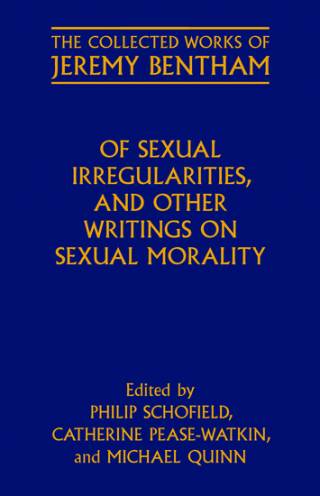 Of Sexual Irregularities, and Other Writings on Sexual Morality (2014).
Of Sexual Irregularities, and Other Writings on Sexual Morality (2014).

Edited by Philip Schofield, Catherine Pease-Watkin, and Michael Quinn.
The present volume contains three essays, 'Of Sexual Irregularities', 'Sextus', and 'General Idea of Not Paul, but Jesus', written in the mid-1810s but never before been published in authoritative form. Bentham presents the utilitarian case for sexual liberty on the grounds that the gratification of the sexual appetite constituted the purest form of pleasure, in opposition to the traditional Christian view that the only morally acceptable form of sexual activity was between one man and one woman, within the confines of marriage, for the purpose of procreation. Bentham offers classical Greece and Rome, where certain male same-sex relationships were regarded as normal, as alternative models of sexual morality, condemns the hostile portrayal of homosexuals in eighteenth-century literature, and calls for the removal of sanctions, whether imposed by religion, law, or public opinion, from all forms of consensual sexual activity, at least in so far as practised in private. Bentham was, moreover, persuaded by Malthus's argument that population growth tended to outstrip food supply. In these circumstances, non-procreative sexual activity had the additional benefit of not contributing to an increase in the size of the population. In the course of his discussion, Bentham expresses forthright views on various aspects of sexuality.
—Oxford University Press Academic.
—Oxford Scholarly Editions Online.
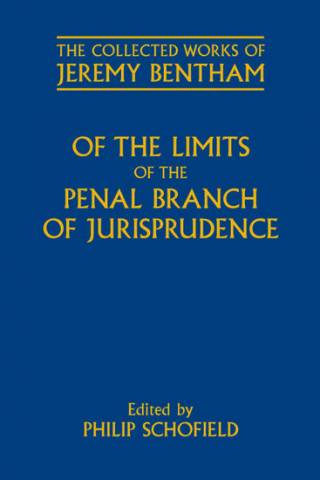 Of the Limits of the Penal Branch of Jurisprudence (2010).
Of the Limits of the Penal Branch of Jurisprudence (2010).

Edited by Philip Schofield.
Of the Limits of the Penal Branch of Jurisprudence, written in 1780–2, is a continuation of An Introduction to the Principles of Morals and Legislation, and thus part of the introduction to the projected penal code on which Bentham worked in the late 1770s and early 1780s. The work emerged from Bentham's attempt to distinguish between civil and penal law, which led him into an exposition of the nature and scope of an individual law and an analysis of such key legal terms as power, duty, right, property, contract, and conveyance. Bentham addresses the relationship between different 'aspects' of the legislator's will, such as command, prohibition, and permission, and in so doing develops a 'logic of the will' which anticipates modern deontic logic.
—Oxford University Press Academic.
—Oxford Scholarly Editions Online.
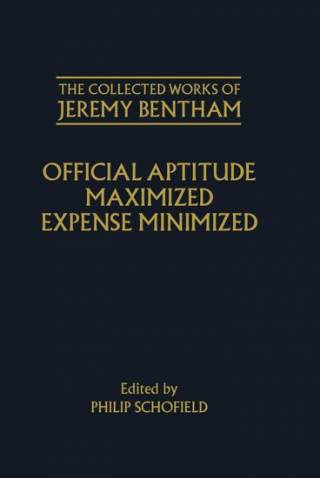 Official Aptitude Maximized, Expense Minimized (1993).
Official Aptitude Maximized, Expense Minimized (1993).

Edited by Philip Schofield.
The essays which Bentham collected together for publication in 1830 under the title of Official Aptitude Maximized; Expense Minimized, written at various times between 1810 and 1830, deal with the means of achieving efficient and economical government. In considering a wide range of themes in the fields of constitutional law, public finance, and legal reform, Bentham places the problem of official corruption at the centre of his analysis. He contrasts his own recommendations for good administration, which he had fully developed in his magisterial Constitutional Code, with the severe deficiencies he saw in English practice. The core of the volume consists of four major essays directed against the principles and policies of four leading statesmen: Edmund Burke, George Rose, Robert Peel, and Lord Chancellor Eldon. Of particular concern to Bentham were the abuses sanctioned by the judges and their officials in the Westminster Hall courts, which, he argues, resulted in the denial of justice to the majority of the population. In this volume, Bentham not only displays the precise logical reasoning for which he is well known, but also his considerable skills as a rhetorician of reform.
—Oxford University Press Academic.
—Oxford Scholarly Editions Online.
Panopticon versus New South Wales and other writings on Australia (2022).
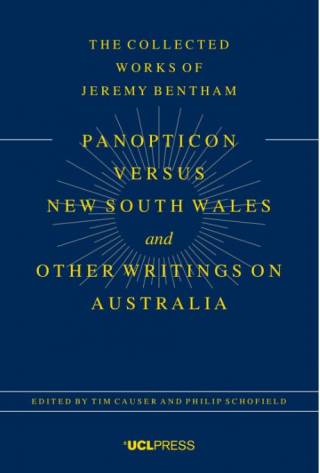

Edited by Tim Causer and Philip Schofield.
The present edition of Panopticon versus New South Wales and other writings on Australia consists of fragmentary comments headed 'New Wales', dating from 1791; a compilation of material sent to William Wilberforce in August 1802; three 'Letters to Lord Pelham' and 'A Plea for the Constitution', written in 1802–3; and 'Colonization Company Proposal', written in August 1831, the majority of which is published here for the first time. These writings, with the exception of 'Colonization Company Proposal', are intimately linked with Bentham’s panopticon penitentiary scheme, which he regarded as an immeasurably superior alternative to criminal transportation, the prison hulks, and English gaols in terms of its effectiveness in achieving the ends of punishment. He argued, moreover, that there was no adequate legal basis for the authority exercised by the Governor of New South Wales. In contrast to his opposition to New South Wales, Bentham later composed 'Colonization Company Proposal' in support of a scheme proposed by the National Colonization Society to establish a colony of free settlers in southern Australia. He advocated the 'vicinity-maximizing principle', whereby plots of land would be sold in an orderly fashion radiating from the main settlement, and suggested that, within a few years, the government of the colony should be transformed into a representative democracy.
—Available as a free open-access PDF, or for purchase in paperback or hardback from UCL Press.
On the Liberty of the Press and Public Discussion, and Other Legal and Political Writings for Spain and Portugal (2012).
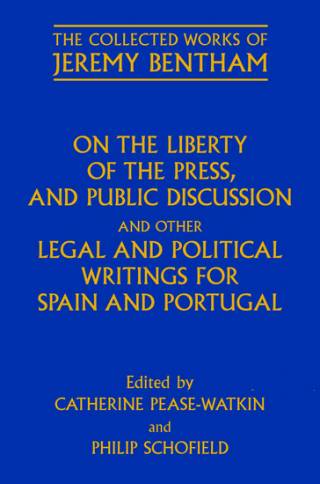

Edited by Catherine Pease-Watkin and Philip Schofield.
The essays contained in On the Liberty of the Press, and Public Discussion represent Bentham's attempt to influence the direction of political and constitutional change taking place in Spain and Portugal in the early 1820s. At the same time as commenting on Spanish and Portuguese questions, Bentham outlined important aspects of his own legal and constitutional theories, defended measures of democratic reform, and offered a vigorous defence of free speech and communication. The volume complements Colonies, Commerce, and Constitutional Law, in which Bentham commented on the disastrous effects on Spain of her attempts to retain her overseas possessions.
—Oxford University Press Academic.
—Oxford Scholarly Editions Online.
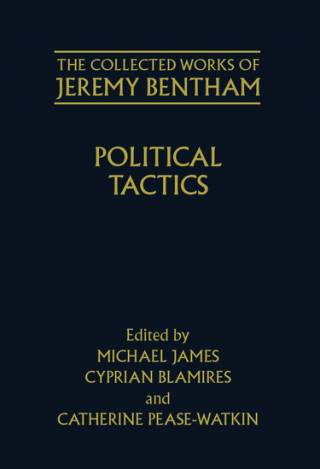 Political Tactics (1999).
Political Tactics (1999).

Edited by Michael James, Cyprian Blamires, and Catherine Pease-Watkin.
Political Tactics, composed for the Estates General in the months just prior to the outbreak of the French Revolution, is one of Bentham's most original works. It contains the earliest and perhaps most important theoretical analysis of parliamentary procedure ever written. It was subsequently translated into many languages and has had a far-reaching influence—for instance, it provided the basis for the regulations adopted in the 1820s governing the procedures of the Buenos Aires assembly, and as recently as the early 1990s it was reprinted by the Spanish Cortes.
—Oxford University Press Academic.
—Oxford Scholarly Editions Online.
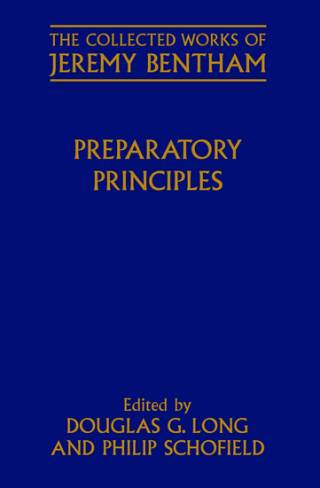 Preparatory Principles (2016).
Preparatory Principles (2016).

Edited by Philip Schofield.
Preparatory Principles is not a linear text in the conventional sense, but consists of a series of short passages on a variety of topics, whose themes are summarised in marginal headings. The material constitutes a philosophical commonplace book, compiled by Bentham in the mid-1770s, in which he worked out the foundational ideas for his new science of legislation. He then drew on this material when composing such works as A Fragment on Government and An Introduction to the Principles of Morals and Legislation.
—Oxford University Press Academic.
—Oxford Scholarly Editions Online.
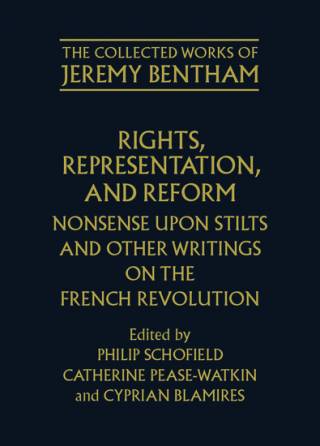 Rights, Representation, and Reform: Nonsense upon Stilts and Other Writings on the French Revolution (2002).
Rights, Representation, and Reform: Nonsense upon Stilts and Other Writings on the French Revolution (2002).

Edited by Philip Schofield, Catherine Pease-Watkin, and Cyprian Blamires.
The French Revolution provided Bentham with what appeared to him to be an exciting opportunity to influence the reconstruction of the French state. Drawing on his knowledge of English political and constitutional practice, as well as the theoretical resources he had developed in his own work, he suggested imaginative and innovative measures to achieve the peaceful and constitutional reform in France. In discussing the nature of representation he produced the earliest utilitarian justification of political equality and representative democracy, even recommending women's suffrage. Moreover, he provided a major critique of the dominant constitutional theory of the division of power, including both the doctrine of the balance of powers and that of the separation of powers.
Turning his attention to Britain, for a time he advocated measures of parlimentary reform, but becoming disenchanted with the course of the Revolution he produced the celebrated 'Nonsense upon Stilts' (hitherto known as 'Anarchical Fallacies'), the most devastating attack on the theory of natural rights ever written, in which he argued that natural rights provided an unsuitable basis for stable legal and political arrangements. All the essays published in this volume, with the exception of 'Emancipate your Colonies!', an important early critique of colony-holding, are based on the original manuscript sources, many of which have not been previously published in any form.
—Oxford University Press Academic.
—Oxford Scholarly Editions Online.
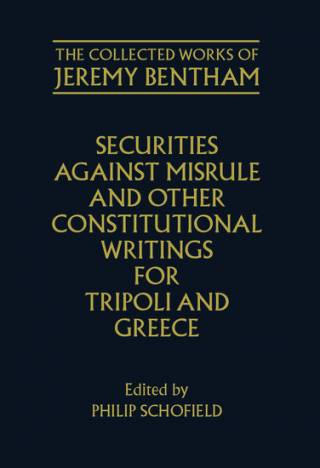 Securities against Misrule and Other Constitutional Writings for Tripoli and Greece (1990).
Securities against Misrule and Other Constitutional Writings for Tripoli and Greece (1990).

Edited by Philip Schofield.
The writings collected in this volume make an important addition to The Collected Works of Jeremy Bentham. They lend credence to Bentham's claim that his ideas were appropriate 'for the use of all nations and all governments professing liberal opinions'. The essays, dating mainly from late 1822 and early 1823, are based exclusively on manuscripts, many of which have not been previously published.
Turning his attention towards the Mediterranean basin, Bentham here attempts to legislate for one Islamic state, and offers advice to another in the process of throwing off Islamic rule. The Writings for Tripoli include the famous 'Securities against Misrule', in which Bentham draws up a constitutional charter with an accompanying explanation of its provisions. He also discusses the social, political, and religious institutions of the country, and proposes a scheme for the introduction of constitutional reform both there and in the other Barbary states. The Writings for Greece include a rare commentary on the first Greek constitution of 1822, and advice and warnings to the Greek legislators against the temptation of 'sinister appetites'. The main theme in both groups of writings is the efficacy of representative institutions and the publicity of official actions in preventing the abuse of government power.
—Oxford University Press Academic.
—Oxford Scholarly Editions Online.
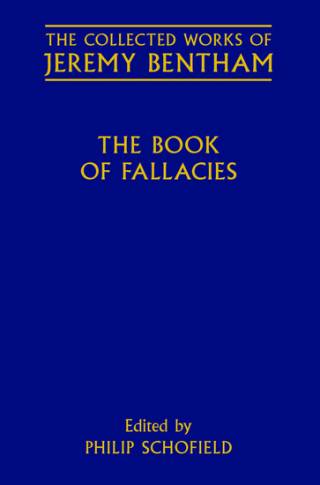 The Book of Fallacies (2015).
The Book of Fallacies (2015).

Edited by Philip Schofield.
First published in 1824 under the editorship of Peregrine Bingham, The Book of Fallacies contains Bentham's highly detailed exposition of a variety of fallacious arguments that might be utilised in a legislative assembly by those in government or by those in opposition. These he categorises into fallacies applying to men's fears, superstitions, antipathies, indolence and indifference, self-diffidence, sympathies, and jealousy and 'envyings'. The present edition of The Book of Fallacies is the first that follows Bentham's own structure for the work, and includes a great deal of material, both in terms of the fallacies themselves and the illustrative matter, that previous versions of the work have omitted. The fallacies that concerned Bentham were not logical errors of the sort identified by Aristotle, or commonplace misunderstandings of matters of fact, but arguments deployed in political debate, in particular in the British Parliament, in order to prevent reform. Bentham not only identified, described, and criticized the fallacious arguments in question, which were all characterized by their irrelevancy, but explained the sinister interests that led politicians to employ them and their supporters to accept them. By exposing these political fallacies, Bentham hoped to prevent their employment in future, and thereby to place political debate on its only proper ground, namely considerations drawn from the principle of utility.
—Oxford University Press Academic.
—Oxford Scholarly Editions Online.
—First edition, 1824 (Google Books).
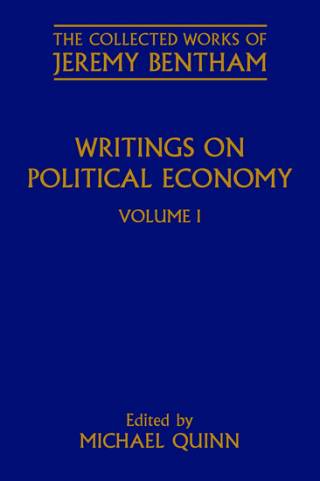 Writings on Political Economy, Volume I (2016).
Writings on Political Economy, Volume I (2016).

Edited by Michael Quinn.
In the mid-1780s Bentham drafted his first sustained discussions of political economy and public finance for Projet Matière (itself part of Projet d'un corps de loix complet). Those discussions are now lost, but the corresponding marginal contents open this volume, followed by three closely related appendices. The volume continues with 'Defence of Usury', first published 1787, which was well received, quickly translated, and established some reputation for Bentham in political economy. In 1790, whilst preparing a second edition, Bentham drafted the raft of additional materials included here in five appendices. At the same time he began 'Manual of Political Economy', an introductory handbook which he never finished, while the surviving text appears here, supplemented by seven appendices. In March 1793 Bentham reacted to press reports of the Irish Budget by composing 'A Protest against Law Taxes', a trenchant critique of the taxation of legal proceedings, and the denial of justice to the poor, which was printed in 1793, published in 1795, and extended in 1816, and which completes the volume.
—Oxford University Press Academic.
—Oxford Scholarly Editions Online.
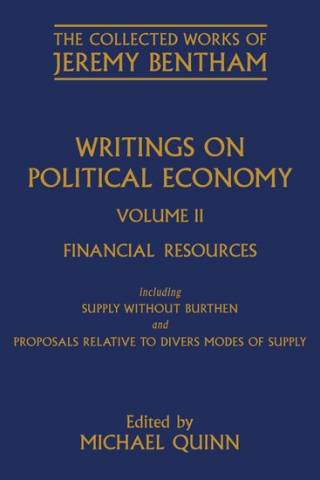 Writings on Political Economy, Volume II (2019).
Writings on Political Economy, Volume II (2019).

Edited by Michael Quinn.
The works contained in this volume, 'Supply without Burthen' and 'Proposals relative to divers modes of Supply', were drafted by Bentham in 1794, during an intense period of activity in which he set out systematically to review possible sources of public revenue. Bentham had long believed that the appropriation of a proportion of the estates of those dying without near relations offered a painless method of raising public revenue, and now developed the proposal in detail, before sending a précis to Charles Long, Secretary to the Treasury. Fifteen months later that précis, with some additions, was published as 'Supply without Burthen', and opens the present volume. Bentham drafted considerable additional material for 'Supply without Burthen' which was neither sent to Long nor published, and which is the source for four Appendices in the present volume. By late September 1794, Bentham envisaged 'Supply without Burthen' as the first of a related series of proposals for generating public revenue. The remaining proposals ranged from further painless expedients, through taxation with compensatory benefit, to taxation pure and simple. Since Bentham viewed all these proposals as connected elements of a single generic enterprise, the fruits of his labours (excepting the proposal which he did publish, namely 'Supply without Burthen') are published together for the first time in the present volume as 'Proposals relative to divers modes of Supply'. This work is followed by six Appendices which shed further light on Bentham's approach to raising public revenue, including his first articulation of what would reappear five years later as his Annuity Note Scheme.
—Oxford University Press Academic.
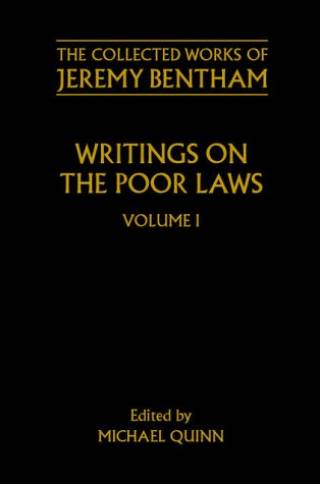 Writings on the Poor Laws, Volume I (2001).
Writings on the Poor Laws, Volume I (2001).

Edited by Michael Quinn.
In the essays presented in this volume Bentham lays down the theoretical principles from which he develops his proposals for reform of the English poor laws in response to the perceived crisis in poor relief in the mid 1790s. In 'Essays on the subject of the Poor Laws' Bentham seeks to justify the principles upon which entitlement to relief should be grounded. He moved beyond the commonplace indictment of idelness and drink to recognize that unemployment, ill health, old age, pregnancy and childbirth constituted a standing threat to the viability of the families of the rural poor. He envisaged the provision of medical care, and of ante- and post natal services to the independent poor, and the establishment of midwifery schools in a national system of workhouses. In 'Pauper Systems Compared' he presents a sustained comparison between home relief and institutional relief, to the detriment of the former, above all for its severance of the link between subsistence and labour. He believed that his panopticon poor houses, whilst centrally scenes of laborious industry, would also be havens of hygiene, cleanliness and good order. The polemical 'Observations on the Poor Bill' is a lively critique of the Bill introduced into the House of Commons by William Pitt in 1796. The ideas advanced here by Bentham were a significant influence on Edwin Chadwick, and through his mediation, on the Poor Law Amendment Act of 1834. The essays are based almost entirely on manuscript sources, and are published here for the first time in definitive form.
—Oxford University Press Academic.
—Oxford Scholarly Editions Online.
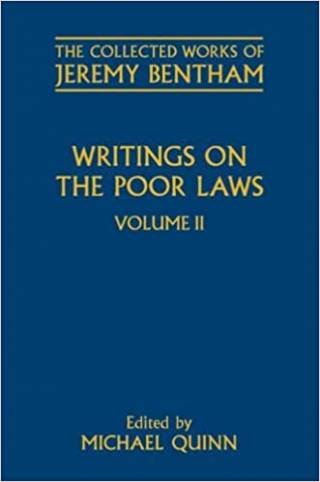 Writings on the Poor Laws, Volume II (2010).
Writings on the Poor Laws, Volume II (2010).

Edited by Michael Quinn.
In the three works contained in this volume, written in 1797–8, Bentham offers a detailed exposition of his plan for the reform of the English poor laws. In 'Pauper Management Improved' and the closely related 'Situation and Relief of the Poor' and 'Outline of a work entitled Pauper Management Improved', Bentham proposes the provision of poor relief in 250 Panopticon Industry Houses, each accommodating 2,000 people, owned and managed by a joint-stock company, the National Charity Company. The dependent poor were to be occupied primarily in the production of their own subsistence, while the Company's viability depended on the indenture until the age of 21 of a rapidly expanding number of children, whose relative productivity would cross-subsidize the provision of relief to the sick and the elderly. Bentham presents his Principles of Management (all intended to unite interest with duty), proposes the provision of Appropriate Establishments for people with disabilities (intended to enhance their productivity, and thereby their life-chances), describes the educational syllabus to be provided to pauper children, and compares the relative strengths and weaknesses of public versus private provision of relief. The volume contains an Editorial Introduction which explains the provenance of the text, and the method of presentation. The texts are fully annotated with textual and historical notes, and the volume is completed with detailed subject and name indices.
—Oxford Scholarly Editions Online.
The Correspondence of Jeremy Bentham
The Bentham Project has so far produced thirteen volumes of Bentham's correspondence, publishing all known letters up to June 1832. The fourteenth volume, currently in preparation, will complete the series, ending with Bentham's death in 1832.
The Correspondence of Jeremy Bentham, Volume 1: 1752–76.Edited by Timothy L.S. Sprigge (The Athlone Press, 1968; UCL Press, 2017). | 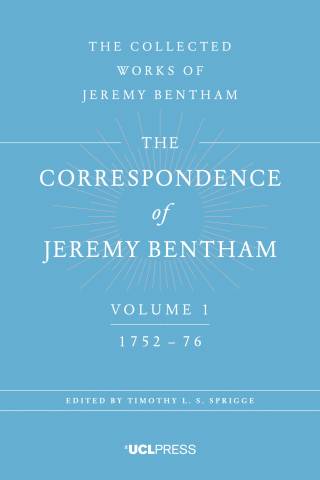 |
The Correspondence of Jeremy Bentham, Volume 2: 1777–80.Edited by Timothy L.S. Sprigge (The Athlone Press, 1968; UCL Press, 2017). | 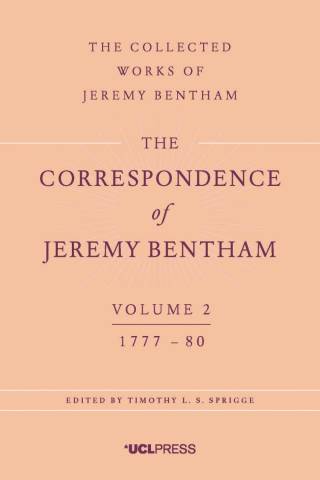 |
The Correspondence of Jeremy Bentham, Volume 3: January 1781 to October 1788.Edited by Ian R. Christie (The Athlone Press, 1971; UCL Press, 2017). | 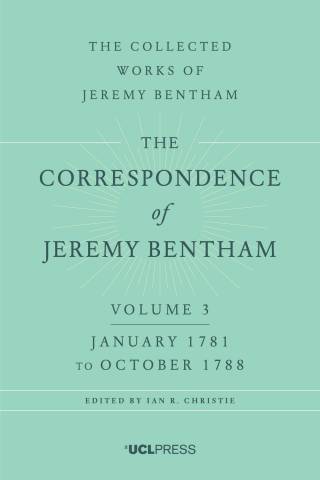 |
The Correspondence of Jeremy Bentham, Volume 4: October 1788 to December 1793.Edited by Alexander Taylor Milne (The Athlone Press, 1981; UCL Press, 2017). | 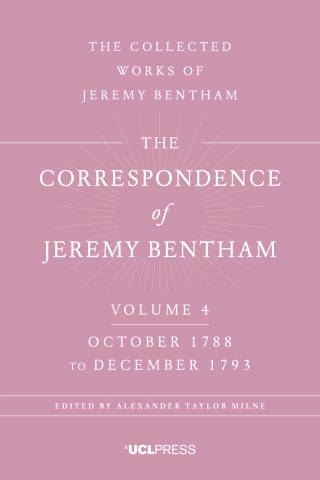 |
The Correspondence of Jeremy Bentham, Volume 5: January 1794 to December 1797.Edited by Alexander Taylor Milne (The Athlone Press, 1981; UCL Press, 2017). | 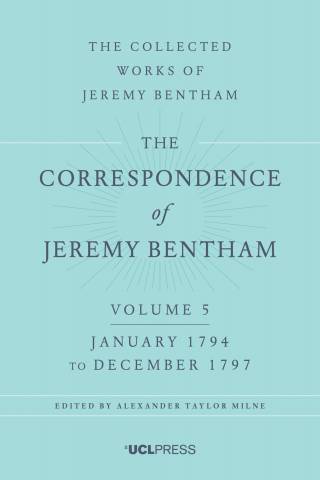 |
The Correspondence of Jeremy Bentham, Volume 6: January 1798 to December 1801.Edited by J.R. Dinwiddy (Clarendon Press, Oxford, 1984). | 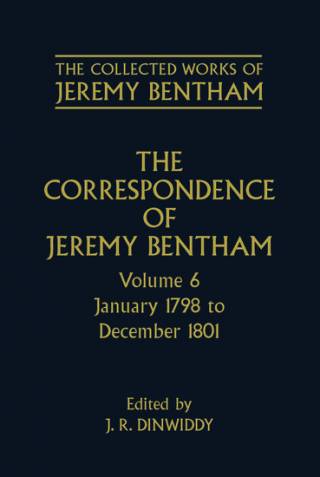 |
The Correspondence of Jeremy Bentham, Volume 7: January 1802 to December 1808.Edited by J.R. Dinwiddy (Clarendon Press, Oxford, 1988). | 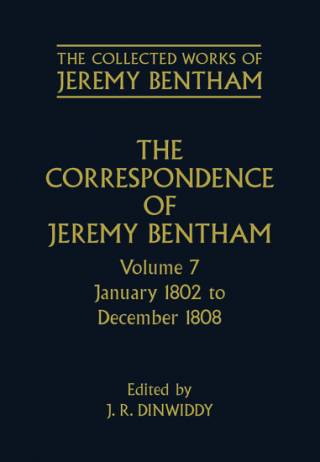 |
The Correspondence of Jeremy Bentham, Volume 8: January 1809 to December 1816.Edited by Stephen Conway (Clarendon Press, Oxford, 1988). | 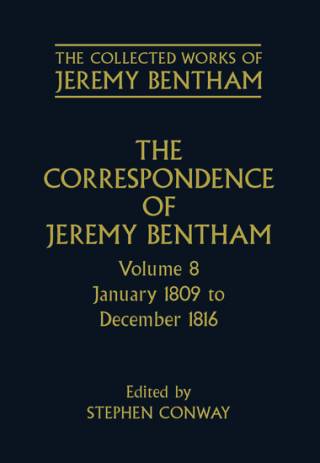
|
The Correspondence of Jeremy Bentham, Volume 9: January 1817 to June 1820.Edited by Stephen Conway (Clarendon Press, Oxford, 1989). | 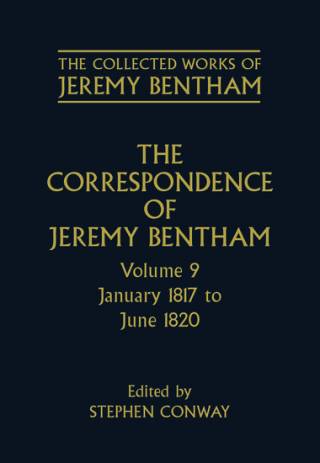 |
The Correspondence of Jeremy Bentham, Volume 10: July 1820 to December 1821.Edited by Stephen Conway (Clarendon Press, Oxford, 1994). | 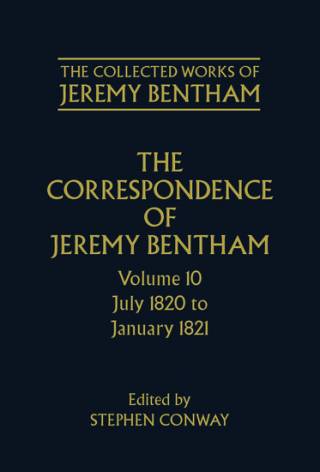 |
The Correspondence of Jeremy Bentham, Volume 11: January 1822 to June 1824.Edited by Catherine Fuller (Clarendon Press, Oxford, 2000). | 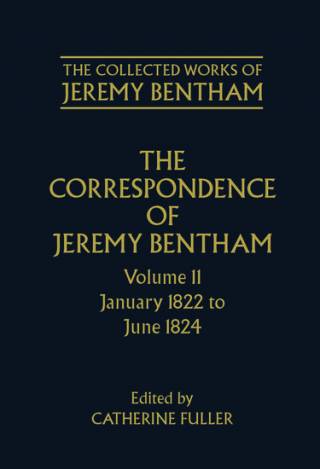 |
The Correspondence of Jeremy Bentham, Volume 12: July 1824 to June 1828.Edited by Luke O'Sullivan and Catherine Fuller (Clarendon Press, Oxford, 2006). | 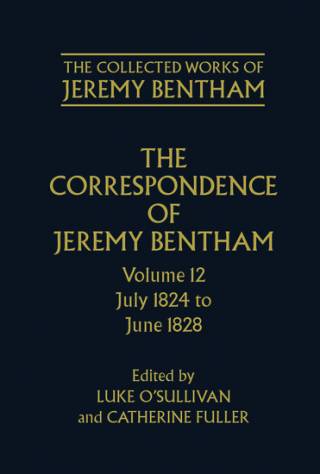 |
The Correspondence of Jeremy Bentham, Volume 13: July 1828 to June 1832.Edited by Philip Schofield, Tim Causer, and Chris Riley (UCL Press, London, 2024). | 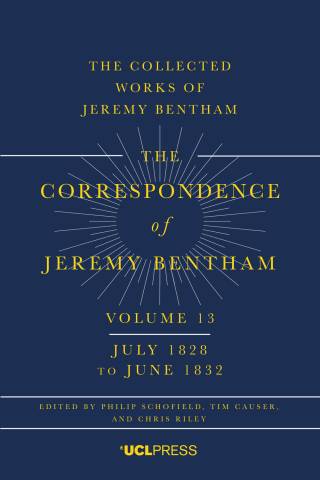 |
Pre-publication Texts and Online Editions
Since 2013, the Bentham Project has published online open-access versions of texts found within the Bentham Papers or with particular relevance to Bentham's thought and life. The texts have been formatted for online presentation, but are also available to download in a print-friendly PDF format, or in TEI-compliant XML.
- Writings on Political Economy, Volume III: Preventive Police, ed. M. Quinn (pre-publication) | PDF
- Writings on Political Economy, Volume IV: Circulating Annuities and other writings on National Debt, ed. M. Quinn (pre-publication) | PDF
- Writings on Political Economy, Volume V: Wealth, Money, and Prices, ed. M. Quinn (pre-publication) | PDF
- Writings on Australia, eds. T. Causer and P. Schofield (pre-publication) | PDF
- Not Paul, but Jesus. Vol. III. Doctrine (preliminary edition) | PDF | XML
- Memorandoms by James Martin | PDF
- A Visit (in 1831) to Jeremy Bentham by George Wheatley | PDF | XML
 Close
Close

